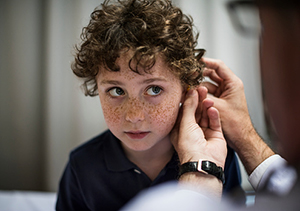Findings from a report published by Bass et al in JAMA Oncology show that childhood cancer survivors with severe hearing loss are at a significant increased risk for neurocognitive deficits, independent of what type of therapy they receive.
This study is the first to objectively measure hearing and neurocognitive function in a large cohort of long-term survivors of childhood cancer stratified by treatment exposures.

Photo credit: Getty
“There has been a lot of research on how children who are born deaf can be affected academically and psychosocially, but far less for kids who acquire hearing loss at some point during their childhood,” said corresponding study author Johnnie Bass, PhD, of St. Jude Children’s Research Hospital Rehabilitation Services. “Our goal was to report on the prevalence, severity, and risk of hearing loss in a large cohort of cancer survivors to assess the impact of hearing impairment on neurocognitive function.”
Study Findings
The researchers evaluated 1,520 childhood cancer survivors and found that more than one-third had severe hearing loss. Those survivors with severe hearing loss were found to be at increased risk for neurocognitive deficits, including deficits in verbal reasoning skills, verbal fluency, visuomotor speed, and mathematics skills. This effect was independent of having been exposed to neurotoxic therapy when compared to survivors with normal hearing or mild hearing loss.
“Even patients not exposed to neurotoxic therapies who develop mild hearing deficits can have problems with their neurocognitive skills,” said senior author Kevin Krull, PhD, of the Department of Epidemiology and Cancer Control at St. Jude. “This makes it important to identify these patients early and suggest interventions to help improve their hearing and thus their neurocognitive outcomes.”
Hearing aids are often recommended to assist with treatment-related hearing loss. The researchers found that of 330 survivors with severe hearing loss in the study for whom a hearing aid had been previously recommended, only 23% were consistently using the devices. Research in individuals who are born with hearing loss, as well as in the elderly with hearing loss, suggests that hearing aids can improve neurocognitive outcomes. More research is needed to determine if this is the case for childhood cancer survivors and to better understand barriers that prevent hearing aid use.
Disclosure: The research was funded in part by grants from the National Institutes of Health and ALSAC. For full disclosures of the study authors, visit jamanetwork.com.

